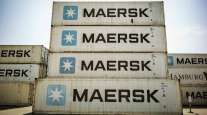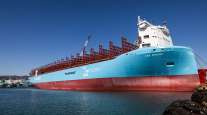Maersk Soars as CFO Says Liner Business `Definitely' Improving

Shares in A.P. Moller-Maersk A/S soared as the company behind the world’s biggest container shipping liner pointed to an improvement in its transport business that it said wasn’t yet reflected in first-quarter results.
The stock jumped as much as 5.5% and traded 4.4% higher at 12,240 kroner as of 11:53 a.m. in Copenhagen, Denmark. The gains followed an initial dip in the share price earlier on May 11 after quarterly results showed profit that missed analyst estimates, with the oil unit that Maersk wants to divest performing best.
Jakob Stausholm, Maersk’s chief financial officer, said the company has seen “actually quite strong demand” in the container business. “You haven’t seen that entirely in our results yet, but we definitely see better market conditions in container liner towards the end of the quarter than what we have seen throughout the quarter, so it’s an optimistic answer from my side,” the CFO said in an interview with Bloomberg Television’s Manus Cranny.
RELATED: Autonomous containership to make debut in 2020
DNB Markets recommended that its clients “use any potential weakness in the share price as a buying opportunity” after the earnings. The report included a “strong beat from Maersk Oil driven by lower exploration cost and operating expenses,” the analysts, including Nicolay Dyvik, said in a note.
Maersk reported a 16% increase in first-quarter profit, with net income at Denmark’s biggest company reaching $245 million, missing the average estimate of $275 million in a Bloomberg survey of 10 analysts. Group revenue rose 5% to $8.96 billion, the Copenhagen-based company said in a statement May 11.
Maersk has given itself an end-of-2018 deadline to come up with a plan to separate its energy units, which include Maersk Oil and Maersk Drilling. The conglomerate wants to focus on its transport divisions, including Maersk Line, the world’s largest container carrier.
Stausholm said the company is “actually very pleased” with the macroeconomic environment it operates in.
The company still expects the global container market to grow 2% to 4% in 2017, with the line unit seen improving its underlying result by more than $1 billion compared with 2016. Maersk Line reported an underlying loss of $80 million in the quarter, hurt by weak freight rates on north-south trade and higher fuel costs.
CEO Soren Skou said in the statement that though the company “cannot be satisfied with the overall profitability in the first quarter, the result is as expected and we reiterate our guidance for the year for the group.”
Maersk Oil, which mainly operates in the North Sea, reported an underlying profit of $292 million compared with a $29 million loss a year earlier. Maersk said the unit’s performance was helped by a higher oil price, lower costs, reduced exploration costs and a one-off tax income of $42 million.




